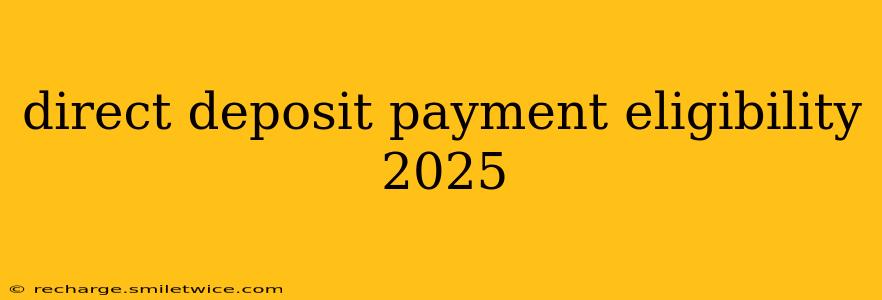Direct deposit is rapidly becoming the preferred method of receiving payments, offering speed, convenience, and security. But who's eligible, and what are the requirements? This comprehensive guide will clarify direct deposit eligibility in 2025, addressing common questions and concerns. While specific rules can vary slightly depending on the payer (employer, government agency, etc.), the core principles remain consistent.
What is Direct Deposit?
Direct deposit is an electronic transfer of funds from a payer (like your employer or the government) directly into your bank account. This eliminates the need for paper checks, offering several key benefits:
- Faster Payments: Funds are usually available immediately or within a day, unlike checks which can take several days to clear.
- Increased Security: Reduces the risk of lost, stolen, or damaged checks.
- Convenience: No need to visit the bank to deposit checks.
- Automatic Payments: Ensures consistent and timely receipt of funds.
Who is Eligible for Direct Deposit in 2025?
Generally, almost anyone with a valid bank account in the United States is eligible for direct deposit. This includes:
- Employees: Most employers offer direct deposit as a standard payroll option.
- Government Benefit Recipients: Social Security, unemployment benefits, and other government payments are typically offered via direct deposit.
- Freelancers and Gig Workers: Many clients and platforms support direct deposit for payment.
- Investors: Dividend and interest payments can often be deposited directly into your account.
What Information is Needed for Direct Deposit Setup?
To set up direct deposit, you'll typically need:
- Your Bank's Routing Number: A nine-digit number identifying your bank.
- Your Account Number: Your unique account number.
- Your Account Type: Checking or savings.
- Your Full Legal Name: As it appears on your bank account.
How Can I Sign Up for Direct Deposit?
The signup process varies slightly depending on the payer. However, it generally involves providing the required information mentioned above to your employer, government agency, or payment provider. Many employers handle this during the onboarding process, while others may provide an online portal for updating payment information. For government benefits, you typically need to apply or update your information through the relevant agency's website.
What Happens if My Bank Account Information Changes?
It's crucial to notify your payer immediately if your bank account information changes. Failure to do so can result in delayed or missed payments. Contact your employer, government agency, or payment provider to update your details.
What are the Fees Associated with Direct Deposit?
Direct deposit itself is generally free. However, your bank may charge fees for certain services, such as overdraft protection or insufficient funds charges. These fees are not directly related to direct deposit but could impact your account balance. Be sure to check your bank's fee schedule.
Can I Use Direct Deposit with Multiple Accounts?
While it's possible to split your payments across multiple accounts (for instance, directing a portion of your paycheck to savings and the rest to checking), it often requires separate setups with your payer. Contact them to confirm their policies on splitting direct deposits.
What if I Don't Have a Bank Account?
If you don't have a bank account, you may have limited options for receiving payments electronically. Consider opening a bank account to access the benefits of direct deposit. There are many options available for low-income individuals and those with limited banking history. Some prepaid debit cards can also accept direct deposit.
Is Direct Deposit Secure?
Direct deposit is generally a very secure payment method. However, it's crucial to protect your banking information and avoid sharing it with unauthorized individuals. Always be cautious of phishing scams and other attempts to obtain your financial details.
This guide aims to provide a clear understanding of direct deposit eligibility in 2025. However, specific eligibility requirements may vary depending on the payer, so always check with your employer, government agency, or payment provider for their specific policies and procedures.
